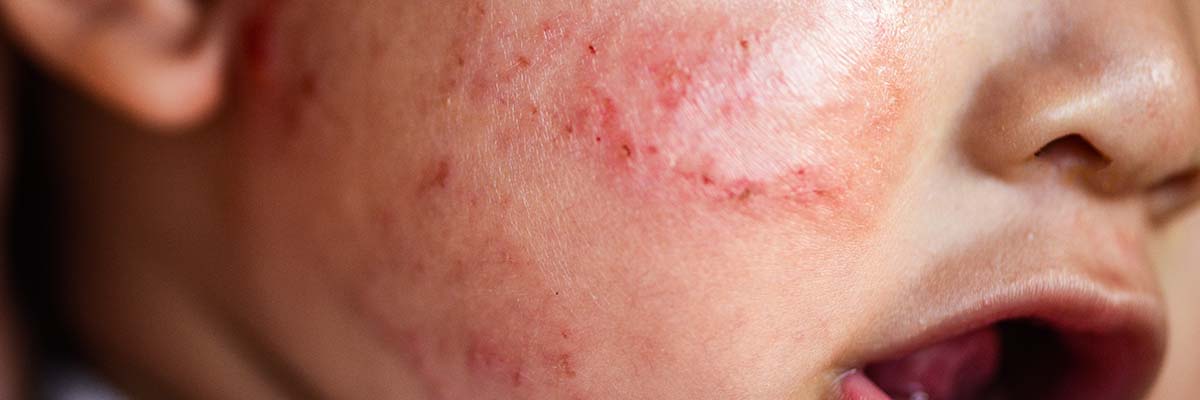Eczema is an umbrella term that describes several skin conditions where you experience dry, red, and itchy patches on the skin.
Eczema is a chronic inflammatory skin condition that is caused by a combination of factors including:
- Genetics
- Abnormal function of the immune system
- Environmental allergens and triggers
There are generally 7 different types of eczema including:
- Atopic dermatitis
- Contact dermatitis
- Dyshidrotic eczema
- Seborrheic dermatitis
- Neurodermatitis
- Nummular eczema
- Stasis dermatitis
Eczema is a lifelong skin disease you will have to manage ongoing. It can get better over time; children tend to grow out of eczema however flares can still arise into adulthood. If you believe food may be the cause for your child’s eczema, you can request a food allergy test by your doctor to identify the potential trigger.
Known examples of things that can irritate eczema include:
- Harsh soaps or detergents
- Perfume and fragranced products
- Makeup
- Dust and sand
- Chlorine
- Solvents
- Dairy

Tips to help ease your eczema symptoms
Avoid scratching
Easier said than done right! Eczema is an incredibly itchy skin condition. What happens though when you rub and scratch the surface of the eczema is that you bring about more inflammation. So scratching has a very short-lived relief but a long-term detrimental effect for helping your eczema.
Instead, when the urge to scratch rises apply an emollient-rich moisturiser to the area. This will help soothe the skin and provide barrier protection that eczema prone skin desperately needs. Ingredients such as colloidal oatmeal are key for eczema sufferers, as it protects the skin and helps it heal.
Bonus points if you apply moisturiser to damp skin to lock in extra hydration.
@ampernaskin @madeleine.edwards shares her AMPERNA skincare regime #eczema #eczemaawareness #eczemacheck #probioticskincare ♬ original sound - Amperna® Skincare
Watch what you wear
Wearing loose, breathable, and light-weight clothing is key when you suffer from eczema. Tight constricting clothing and synthetic fabrics are not ideal to wear when you have eczema as your skin is extremely sensitive and is easily irritated.
Fabrics to avoid:
- Nylon
- Polyester
- Wool
- Fleece
- Spandex
- Latex
Fabrics that will not irritate:
- Cotton
- Silk
- Micro-fibre

Avoid extreme temperatures and humidity
Dry cold climates pull water out of your skin, which is unwelcome news for eczema sufferers. Hot and humid climates can also aggravate eczema by increasing vasodilation to the surface of the skin to cool the body. Perspiring and sweating is an irritant to eczema, so you want to try and maintain being in a comfortable environment to avoid inflaming your eczema.
Lukewarm is the way to go
Keep the water you use for showering or bathing lukewarm and never scolding hot. As mentioned above, eczema detests extremes in temperature, so keep your showers short, sweet, and lukewarm.
Also avoid using harsh fragranced soap/cleanser. Stick to gentle body washes that will not damage your lipid barrier and aggravate eczema.
Stress management
Stress plays a significant role in the health of our skin, in particular people suffering from eczema. Quality sleep every night will help the management of your stress levels. Sleep deprivation triggers stress responses in your body further exasperating itch resulting in you scratching which brings about the likelihood of spreading harmful bacteria elsewhere on your skin. Thus, the cycle of prolonging getting your eczema flares under control. We cannot stress enough on how important keeping your stress levels low & quality of sleep high.
Awareness of environmental allergens
Dust mites, mold, pollen, pet dander… it is imperative to keep these allergens at bay in your living space by frequently dusting, vacuuming, laundering your bedding, regularly grooming your pets, and airing out your home.
Simple skincare routine
This is KEY!
The less product that meets your skin the better. When you incorporate too many products with ingredients that accumulatively clash can be an irritation cocktail.
Think minimal, gentle, and soothing products. You should only be using the following four essential products in your regime:
- Gentle (soap-free) cleanser for your face and body
- Hydrating serum
- Moisturiser
- SPF
The AMPERNA® range is perfect for eczema sufferers.

Side effects from prescribed medication to treat eczema
Steroids such as hydrocortisone are usually prescribed by doctors or dermatologists to treat skin conditions like eczema. Steroid creams come in a range of strengths so be sure to do your research and understand what strength has been recommended for you and for how long. Steroid creams should not be used long term. If you have been using a steroid cream for months or even a few years to treat your eczema and you keep getting prescribed a stronger percentage, you should consider tapering off using them. Slowly.
Steroid creams, although it may feel that they have a short-term relief for your skin, they do not get to the root cause of your eczema. They suppress your body’s natural reaction at fighting inflammation. Your skin then gets used to this drug but will need a stronger dose over time when the lighter percentage is not effective anymore. Thus, the vicious unsustainable cycle begins.
You can read more detail on steroid creams and side effects in these blog posts attached:
@ampernaskin Topical Steroid Withdrawl can take a toll on your life - Kiri shares her tips 💬 #topicalsteroidwithdrawal #tsw #steroids #immunosuppressant ♬ Anti-Hero - Taylor Swift
Kiri is here to help. Reach out any time via our website or DM directly if you have any questions on eczema or steroid creams.
You can also book one on one holistic skin coaching sessions.



















